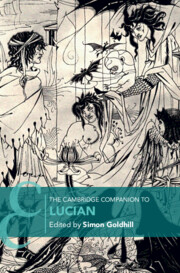Book contents
- Frontmatter
- Contents
- List of Figures and Tables
- List of Contributors
- 1 Introduction
- Part I
- Part II
- 8 In Praise of the Fly
- 9 Lucian’s Phalaris
- 10 Lucian the Doorkeeper: Inside and Outside in Lucianic Poetics
- 11 Geographical Authority and Bodily Entanglement in Lucian’s True Histories
- 12 Menippus Goes to the Moon: Fantastical Astronomy and Lucian’s Scientific Imagination
- 13 Lucian and Christianity
- 14 Identification and Distance in Lucian’s Dialogues of the Courtesans: Subjects and Their Absences
- 15 ‘Here’s Looking at You … ’: The Dialogues of the Gods and the Erotics of the Visual
- Part III
- References
- Index Locorum
- Subject Index
- Cambridge Companions to Literature
9 - Lucian’s Phalaris
from Part II
Published online by Cambridge University Press: 07 November 2024
- Frontmatter
- Contents
- List of Figures and Tables
- List of Contributors
- 1 Introduction
- Part I
- Part II
- 8 In Praise of the Fly
- 9 Lucian’s Phalaris
- 10 Lucian the Doorkeeper: Inside and Outside in Lucianic Poetics
- 11 Geographical Authority and Bodily Entanglement in Lucian’s True Histories
- 12 Menippus Goes to the Moon: Fantastical Astronomy and Lucian’s Scientific Imagination
- 13 Lucian and Christianity
- 14 Identification and Distance in Lucian’s Dialogues of the Courtesans: Subjects and Their Absences
- 15 ‘Here’s Looking at You … ’: The Dialogues of the Gods and the Erotics of the Visual
- Part III
- References
- Index Locorum
- Subject Index
- Cambridge Companions to Literature
Summary
Defending the indefensible and praising the unpraiseworthy were staples of Greek declamation in the Roman imperial period. Lucian’s Phalaris I and II have generally been considered as undemanding rhetorical exercises, inverting the standard tropes of anti-tyrant invective to produce a paradoxical encomium of the proverbially wicked tyrant Phalaris of Akragas. This paper argues that Phalaris I and II are in fact considerably more sophisticated and caustic texts then they appear at first sight. Phalaris’ letter to the Delphians in Phalaris I is carefully crafted to show that Phalaris is indeed, despite his protestations, a self-deluding psychopath; he now wishes to dedicate his notorious bronze bull to the Delphic Apollo in order to whitewash his terrible reputation. The speech of the anonymous Delphian in Phalaris II makes a radically cynical case for welcoming the gift of the bull with no questions asked, in full knowledge that Phalaris may be just as wicked as he is reputed to be. The texts are an ironic commentary on the murky ethics of Delphic patronage in the second century CE, and the venality of oracular shrines more generally; Lucian may specifically have in mind the lavish Delphic patronage of the Roman emperor Domitian.
- Type
- Chapter
- Information
- The Cambridge Companion to Lucian , pp. 186 - 201Publisher: Cambridge University PressPrint publication year: 2024

